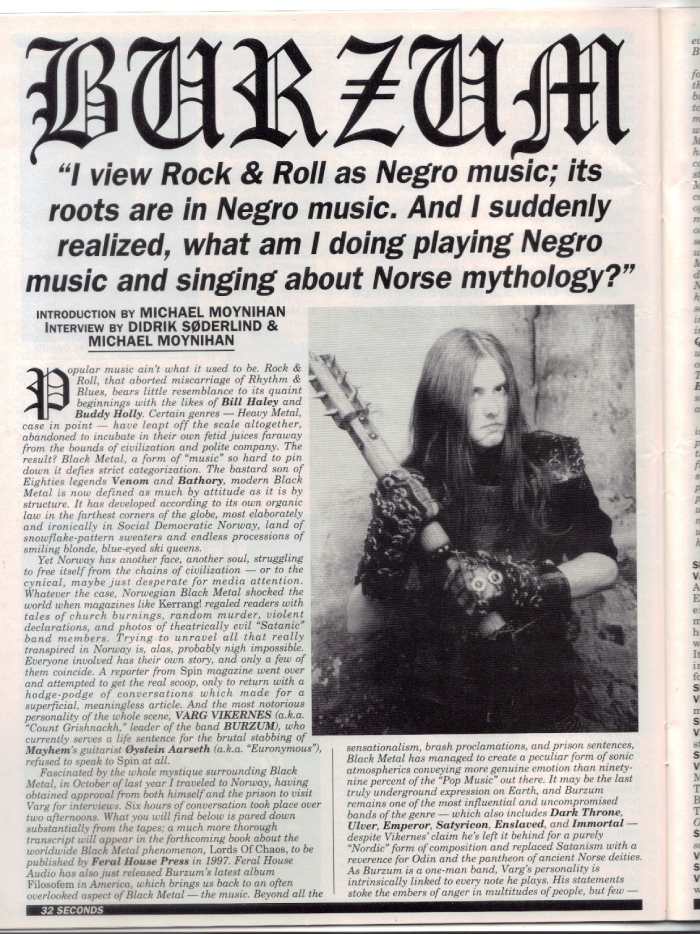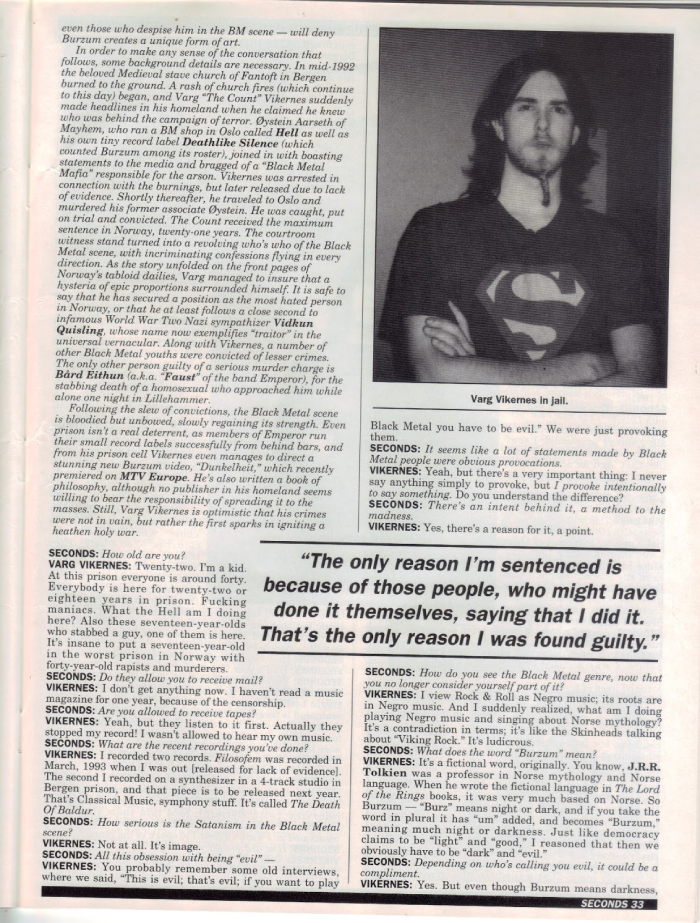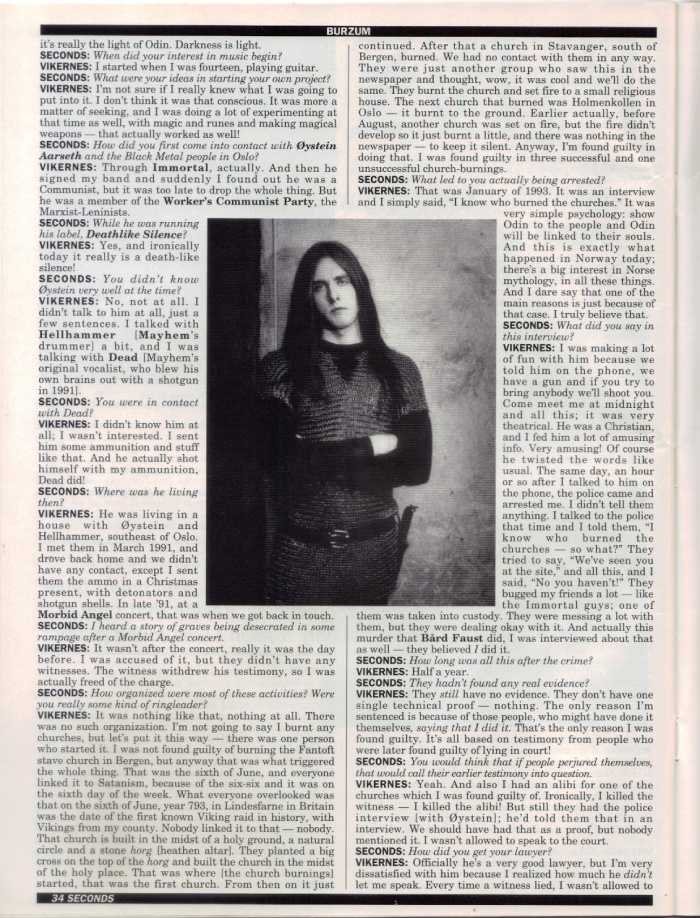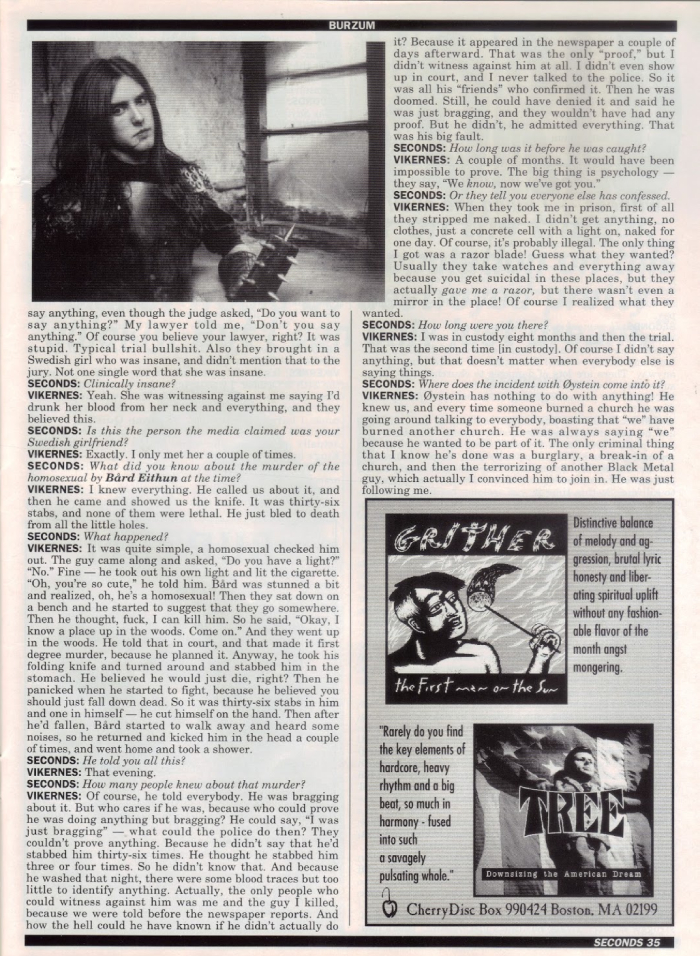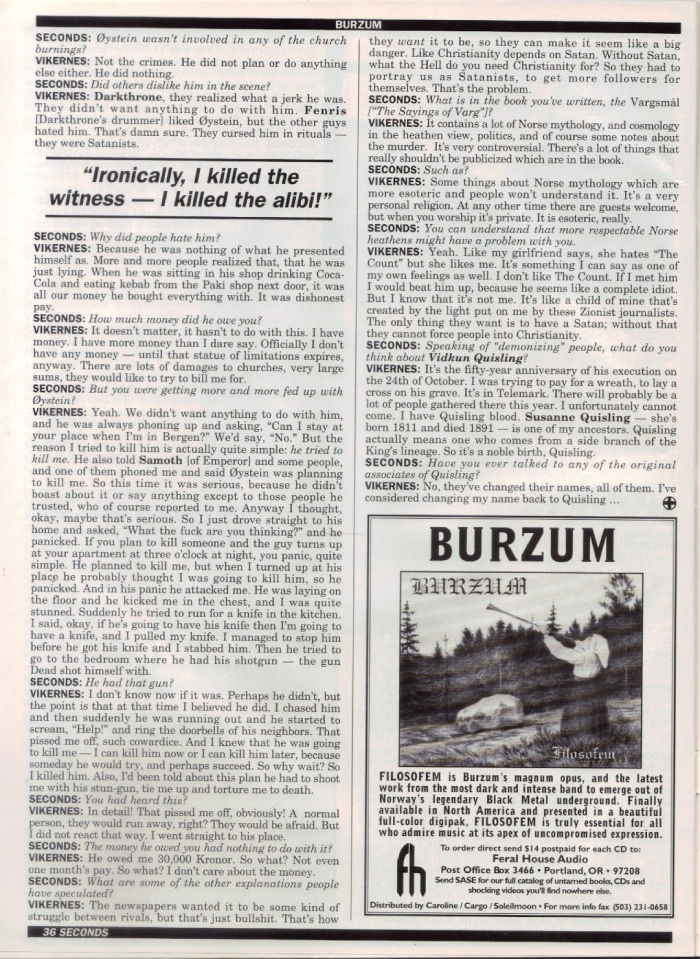
LIBRARY
BURZUM: "I view Rock&Roll as Negro music; its roots are in Negro music. And I suddenly realized, what am I doing playing Negro music and singing about Norse mythology?"
Interview with Varg Vikernes
"Seconds" magazine (#41, 1997)
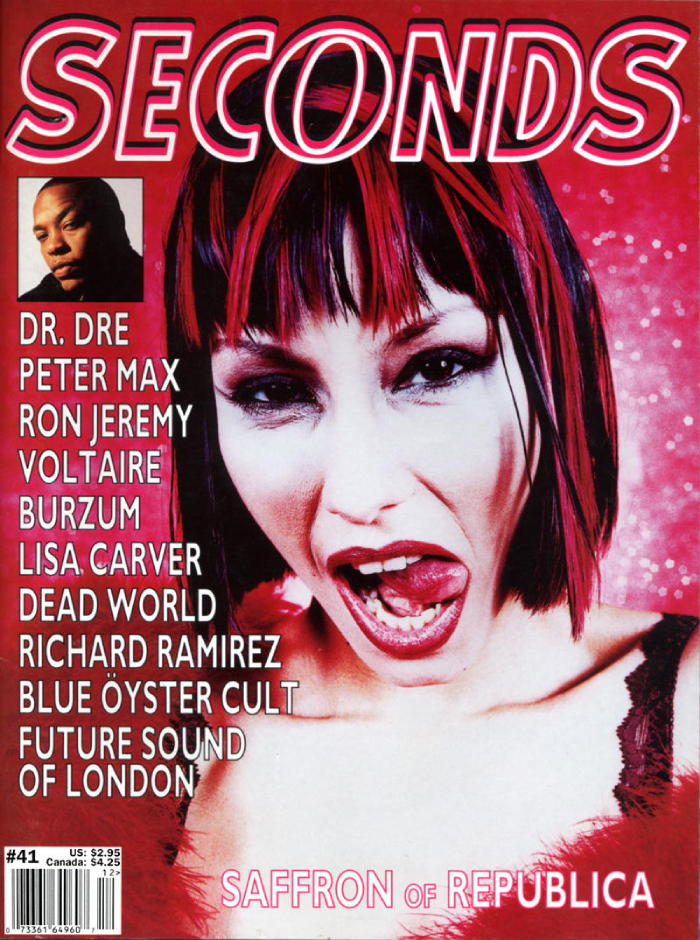
Introduction by Michael Moynihan
Interview by Didrik Søderlind & Michael Moynihan
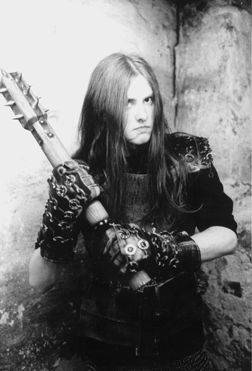 Popular music ain't what it used to be. Rock&Roll, that aborted miscarriage of Rhythm&Blues, bears little resemblance to its quaint beginnings with the likes of Bill Haley and Buddy Holly. Certain genres - Heavy Metal, case in point - have leapt off the scale altogether, abandoned to incubate in their own fetid juices faraway from the bounds of civilization and polite company. The result? Black Metal, a form of "music" so hard to pin down it defies strict categorization. The bastard son of Eighties legends Venom and Bathory, modern Black Metal is now defined as much by attitude as it is by structure. It has developed according to its own organic law in the farthest corners of the globe, most elaborately and ironically in Social Democratic Norway, land of snowflake-pattern sweaters and endless processions of smiling blonde, blue-eyed ski queens.
Popular music ain't what it used to be. Rock&Roll, that aborted miscarriage of Rhythm&Blues, bears little resemblance to its quaint beginnings with the likes of Bill Haley and Buddy Holly. Certain genres - Heavy Metal, case in point - have leapt off the scale altogether, abandoned to incubate in their own fetid juices faraway from the bounds of civilization and polite company. The result? Black Metal, a form of "music" so hard to pin down it defies strict categorization. The bastard son of Eighties legends Venom and Bathory, modern Black Metal is now defined as much by attitude as it is by structure. It has developed according to its own organic law in the farthest corners of the globe, most elaborately and ironically in Social Democratic Norway, land of snowflake-pattern sweaters and endless processions of smiling blonde, blue-eyed ski queens.
Yet Norway has another face, another soul, struggling to free itself from the chains of civilization - or to the cynical, maybe just desperate for media attention. Whatever the case, Norwegian Black Metal shocked the world when magazines like "Kerrang!" regaled readers with tales of church burnings, random murder, violent declarations, and photos of theatrically evil "Satanic" band members. Trying to unravel all that really transpired in Norway is, alas, probably nigh impossible. Everyone involved has their own story, and only a few of them coincide. A reporter from "Spin" magazine went over and attempted to get the real scoop, only to return with a hodge-podge of conversations which made for a superficial, meaningless article. And the most notorious personality of the whole scene, Varg Vikernes (a.k.a. "Count Grishnackh," leader of the band Burzum), who currently serves a life sentence for the brutal stabbing of Mayhem's guitarist Øystein Aarseth (a.k.a. "Euronymous"), refused to speak to "Spin" at all.
Fascinated by the whole mystique surrounding Black Metal, in October of last year I traveled to Norway, having obtained approval from both himself and the prison to visit Varg for interviews. Six hours of conversation took place over two afternoons. What you will find below is pared down substantially from the tapes; a much more thorough transcript will appear in the forthcoming book about the worldwide Black Metal phenomenon, "Lords Of Chaos", to be published by "Feral House Press" in 1997. "Feral House Audio" has also just released Burzum's latest album "Filosofem" in America, which brings us back to an often overlooked aspect of Black Metal - the music. Beyond all the sensationalism, brash proclamations, and prison sentences, Black Metal has managed to create a peculiar form of sonic atmospherics conveying more genuine emotion than ninety-nine percent of the "Pop Music" out there. It may be the last truly underground expression on Earth, and Burzum remains one of the most influential and uncompromised bands of the genre - which also includes Darkthrone, Ulver, Emperor, Satyricon, Enslaved, and Immortal - despite Vikernes' claim he's left it behind for a purely "Nordic" form of composition and replaced Satanism with a reverence for Odin and the pantheon of ancient Norse deities. As Burzum is a one-man band, Varg's personality is intrinsically linked to every note he plays. His statements stoke the embers of anger in multitudes of people, but few - even those who despise him in the BM scene - will deny Burzum creates a unique form of art.
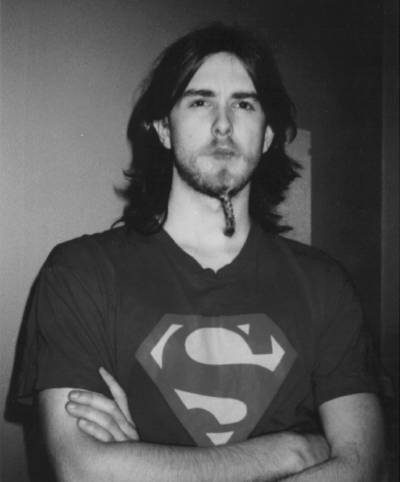 In order to make any sense of the conversation that follows, some background details are necessary. In mid-1992 the beloved Medieval stave church of Fantoft in Bergen burned to the ground. A rash of church fires (which continue to this day) began, and Varg "The Count" Vikernes suddenly made headlines in his homeland when he claimed he knew who was behind the campaign of terror. Øystein Aarseth of Mayhem, who ran a BM shop in Oslo called "Hell" as well as his own tiny record label Deathlike Silence (which counted Burzum among its roster), joined in with boasting statements to the media and bragged of a "Black Metal Mafia" responsible for the arson. Vikernes was arrested in connection with the burnings, but later released due to lack of evidence. Shortly thereafter, he traveled to Oslo and murdered his former associate Øystein. He was caught, put on trial and convicted. The Count received the maximum sentence in Norway, twenty-one years. The courtroom witness stand turned into a revolving who's who of the Black Metal scene, with incriminating confessions flying in every direction. As the story unfolded on the front pages of Norway's tabloid dailies, Varg managed to insure that a hysteria of epic proportions surrounded himself. It is safe to say that he has secured a position as the most hated person in Norway, or that he at least follows a close second to infamous World War Two Nazi sympathizer Vidkun Quisling, whose name now exemplifies "traitor" in the universal vernacular. Along with Vikernes, a number of other Black Metal youths were convicted of lesser crimes. The only other person guilty of a serious murder charge is Bård Eithun (a.k.a. "Faust" of the band Emperor), for the stabbing death of a homosexual who approached him while alone one night in Lillehammer.
In order to make any sense of the conversation that follows, some background details are necessary. In mid-1992 the beloved Medieval stave church of Fantoft in Bergen burned to the ground. A rash of church fires (which continue to this day) began, and Varg "The Count" Vikernes suddenly made headlines in his homeland when he claimed he knew who was behind the campaign of terror. Øystein Aarseth of Mayhem, who ran a BM shop in Oslo called "Hell" as well as his own tiny record label Deathlike Silence (which counted Burzum among its roster), joined in with boasting statements to the media and bragged of a "Black Metal Mafia" responsible for the arson. Vikernes was arrested in connection with the burnings, but later released due to lack of evidence. Shortly thereafter, he traveled to Oslo and murdered his former associate Øystein. He was caught, put on trial and convicted. The Count received the maximum sentence in Norway, twenty-one years. The courtroom witness stand turned into a revolving who's who of the Black Metal scene, with incriminating confessions flying in every direction. As the story unfolded on the front pages of Norway's tabloid dailies, Varg managed to insure that a hysteria of epic proportions surrounded himself. It is safe to say that he has secured a position as the most hated person in Norway, or that he at least follows a close second to infamous World War Two Nazi sympathizer Vidkun Quisling, whose name now exemplifies "traitor" in the universal vernacular. Along with Vikernes, a number of other Black Metal youths were convicted of lesser crimes. The only other person guilty of a serious murder charge is Bård Eithun (a.k.a. "Faust" of the band Emperor), for the stabbing death of a homosexual who approached him while alone one night in Lillehammer.
Following the slew of convictions, the Black Metal scene is bloodied but unbowed, slowly regaining its strength. Even prison isn't a real deterrent, as members of Emperor run their small record labels successfully from behind bars, and from his prison cell Vikernes even manages to direct a stunning new Burzum video, "Dunkelheit", which recently premiered on MTV Europe. He's also written a book of philosophy, although no publisher in his homeland seems willing to bear the responsibility of spreading it to the masses. Still, Varg Vikernes is optimistic that his crimes were not in vain, but rather the first sparks in igniting a heathen holy war.
***
How old are you?
Twenty-two. I'm a kid. At this prison everyone is around forty. Everybody is here for twenty-two or eighteen years in prison. Fucking maniacs. What the Hell am I doing here? Also these seventeen-year-olds who stabbed a guy, one of them is here. It's insane to put a seventeen-year-old in the worst prison in Norway with forty-year-old rapists and murderers.
Do they allow you to receive mail?
I don't get anything now. I haven't read a music magazine for one year, because of the censorship.
Are you allowed to receive tapes?
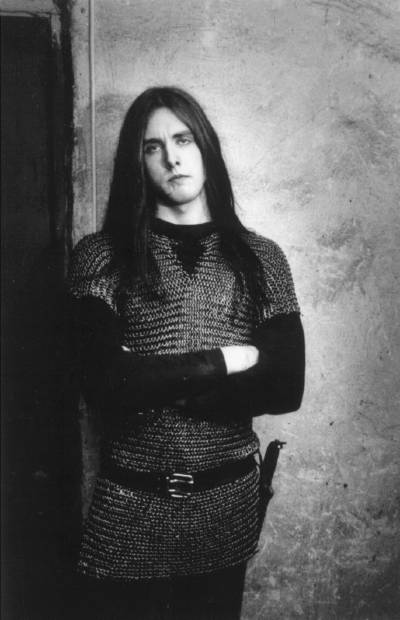 Yeah, but they listen to it first. Actually they stopped my record! I wasn't allowed to hear my own music.
Yeah, but they listen to it first. Actually they stopped my record! I wasn't allowed to hear my own music.
What are the recent recordings you've done?
I recorded two records. "Filosofem" was recorded in March, 1993 when I was out [released for lack of evidence]. The second I recorded on a synthesizer in a 4-track studio in Bergen prison, and that piece is to be released next year. That's Classical Music, symphony stuff. It's called The Death Of Baldur.
How serious is the Satanism in the Black Metal scene?
Not at all. It's image.
All this obsession with being "evil" -
You probably remember some old interviews, where we said, "This is evil; that's evil; if you want to play Black Metal you have to be evil". We were just provoking them.
It seems like a lot of statements made by Black Metal people were obvious provocations.
Yeah, but there's a very important thing: I never say anything simply to provoke, but I provoke intentionally to say something. Do you understand the difference?
There's an intent behind it, a method to the madness.
Yes, there's a reason for it, a point.
How do you see the Black Metal genre, now that you no longer consider yourself part of it?
I view Rock&Roll as Negro music; its roots are in Negro music. And I suddenly realized, what am I doing playing Negro music and singing about Norse mythology? It's a contradiction in terms; it's like the Skinheads talking about "Viking Rock". It's ludicrous.
What does the word "Burzum" mean?
It's a fictional word, originally. You know, J.R.R. Tolkien was a professor in Norse mythology and Norse language. When he wrote the fictional language in "The Lord of the Rings" books, it was very much based on Norse. So Burzum - "Burz" means night or dark, and if you take the word in plural it has "um" added, and becomes "Burzum," meaning much night or darkness. Just like democracy claims to be "light" and "good", I reasoned that then we obviously have to be "dark" and "evil".
Depending on who's calling you evil, it could be a compliment.
Yes. But even though Burzum means darkness, it's really the light of Odin. Darkness is light.
When did your interest in music begin?
I started when I was fourteen, playing guitar.
What were your ideas in starting your own project?
I'm not sure if I really knew what I was going to put into it. I don't think it was that conscious. It was more a matter of seeking, and I was doing a lot of experimenting at that time as well, with magic and runes and making magical weapons - that actually worked as well!
How did you first come into contact with Øystein Aarseth and the Black Metal people in Oslo?
Through Immortal, actually. And then he signed my band and suddenly I found out he was a Communist, but it was too late to drop the whole thing. But he was a member of the Worker's Communist Party, the Marxist-Leninists.
While he was running his label, Deathlike Silence?
Yes, and ironically today it really is a death-like silence!
You didn't know Øystein very well at the time?
No, not at all. I didn't talk to him at all, just a few sentences. I talked with Hellhammer [Mayhem's drummer] a bit, and I was talking with Dead [Mayhem's original vocalist, who blew his own brains out with a shotgun in 1991].
You were in contact with Dead?
I didn't know him at all; I wasn't interested. I sent him some ammunition and stuff like that. And he actually shot himself with my ammunition, Dead did!
Where was he living then?
He was living in a house with Øystein and Hellhammer, southeast of Oslo. I met them in March 1991, and drove back home and we didn't have any contact, except I sent them the ammo in a Christmas present, with detonators and shotgun shells. In late '91, at a Morbid Angel concert, that was when we got back in touch.
I heard a story of graves being desecrated in some rampage after a Morbid Angel concert.
It wasn't after the concert, really it was the day before. I was accused of it, but they didn't have any witnesses. The witness withdrew his testimony, so I was actually freed of the charge.
How organized were most of these activities? Were you really some kind of ringleader?
It was nothing like that, nothing at all. There was no such organization. I'm not going to say I burnt any churches, but let's put it this way - there was one person who started it. I was not found guilty of burning the Fantoft stave church in Bergen, but anyway that was what triggered the whole thing. That was the sixth of June, and everyone linked it to Satanism, because of the six-six and it was on the sixth day of the week. What everyone overlooked was that on the sixth of June, year 793, in Lindesfarne in Britain was the date of the first known Viking raid in history, with Vikings from my county. Nobody linked it to that - nobody. That church is built in the midst of a holy ground, a natural circle and a stone horg [heathen altar]. They planted a big cross on the top of the horg and built the church in the midst of the holy place. That was where [the church burnings] started, that was the first church. From then on it just continued. After that a church in Stavanger, south of Bergen, burned. We had no contact with them in any way. They were just another group who saw this in the newspaper and thought, wow, it was cool and we'll do the same. They burnt the church and set fire to a small religious house. The next church that burned was Holmenkollen in Oslo - it burnt to the ground. Earlier actually, before August, another church was set on fire, but the fire didn't develop so it just burnt a little, and there was nothing in the newspaper - to keep it silent. Anyway, I'm found guilty in doing that. I was found guilty in three successful and one unsuccessful church-burnings.
What led to you actually being arrested?
That was January of 1993. It was an interview and I simply said, "I know who burned the churches". It was very simple psychology: show Odin to the people and Odin will be linked to their souls. And this is exactly what happened in Norway today; there's a big interest in Norse mythology, in all these things. And I dare say that one of the main reasons is just because of that case. I truly believe that.
What did you say in this interview?
I was making a lot of fun with him because we told him on the phone, we have a gun and if you try to bring anybody we'll shoot you. Come meet me at midnight and all this; it was very theatrical. He was a Christian, and I fed him a lot of amusing info. Very amusing! Of course he twisted the words like usual. The same day, an hour or so after I talked to him on the phone, the police came and arrested me. I didn't tell them anything. I talked to the police that time and I told them, "I know who burned the churches - so what?" They tried to say, "We've seen you at the site," and all this, and I said, "No you haven't!" They bugged my friends a lot - like the Immortal guys; one of them was taken into custody. They were messing a lot with them, but they were dealing okay with it. And actually this murder that Bård Faust did, I was interviewed about that as well - they believed I did it.
How long was all this after the crime?
Half a year.
They hadn't found any real evidence?
They still have no evidence. They don't have one single technical proof - nothing. The only reason I'm sentenced is because of those people, who might have done it themselves, saying that I did it. That's the only reason I was found guilty. It's all based on testimony from people who were later found guilty of lying in court!
You would think that if people perjured themselves, that would call their earlier testimony into question.
Yeah. And also I had an alibi for one of the churches which I was found guilty of. Ironically, I killed the witness - I killed the alibi! But still they had the police interview [with Øystein]; he'd told them that in an interview. We should have had that as a proof, but nobody mentioned it. I wasn't allowed to speak to the court.
How did you get your lawyer?
Officially he's a very good lawyer, but I'm very dissatisfied with him because I realized how much he didn't let me speak. Every time a witness lied, I wasn't allowed to say anything, even though the judge asked, "Do you want to say anything?" My lawyer told me, "Don't you say anything." Of course you believe your lawyer, right? It was stupid. Typical trial bullshit. Also they brought in a Swedish girl who was insane, and didn't mention that to the jury. Not one single word that she was insane.
Clinically insane?
Yeah. She was witnessing against me saying I'd drunk her blood from her neck and everything, and they believed this.
Is this the person the media claimed was your Swedish girlfriend?
Exactly. I only met her a couple of times.
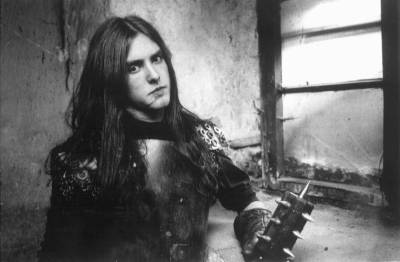 What did you know about the murder of the homosexual by Bård Eithun at the time?
What did you know about the murder of the homosexual by Bård Eithun at the time?
I knew everything. He called us about it, and then he came and showed us the knife. It was thirty-six stabs, and none of them were lethal. He just bled to death from all the little holes.
What happened?
It was quite simple, a homosexual checked him out. The guy came along and asked, "Do you have a light?" "No." Fine - he took out his own light and lit the cigarette. "Oh, you're so cute," he told him. Bård was stunned a bit and realized, oh, he's a homosexual! Then they sat down on a bench and he started to suggest that they go somewhere. Then he thought, fuck, I can kill him. So he said, "Okay, I know a place up in the woods. Come on." And they went up in the woods. He told that in court, and that made it first degree murder, because he planned it. Anyway, he took his folding knife and turned around and stabbed him in the stomach. He believed he would just die, right? Then he panicked when he started to fight, because he believed you should just fall down dead. So it was thirty-six stabs in him and one in himself - he cut himself on the hand. Then after he'd fallen, Bård started to walk away and heard some noises, so he returned and kicked him in the head a couple of times, and went home and took a shower.
He told you all this?
That evening.
How many people knew about that murder?
Of course, he told everybody. He was bragging about it. But who cares if he was, because who could prove he was doing anything but bragging? He could say, "I was just bragging" - what could the police do then? They couldn't prove anything. Because he didn't say that he'd stabbed him thirty-six times. He thought he stabbed him three or four times. So he didn't know that. And because he washed that night, there were some blood traces but too little to identify anything. Actually, the only people who could witness against him was me and the guy I killed, because we were told before the newspaper reports. And how the hell could he have known if he didn't actually do it? Because it appeared in the newspaper a couple of days afterward. That was the only "proof," but I didn't witness against him at all. I didn't even show up in court, and I never talked to the police. So it was all his "friends" who confirmed it. Then he was doomed. Still, he could have denied it and said he was just bragging, and they wouldn't have had any proof. But he didn't, he admitted everything. That was his big fault.
How long was it before he was caught?
A couple of months. It would have been impossible to prove. The big thing is psychology - they say, "We know, now we've got you".
Or they tell you everyone else has confessed.
When they took me in prison, first of all they stripped me naked. I didn't get anything, no clothes, just a concrete cell with a light on, naked for one day. Of course, it's probably illegal. The only thing I got was a razor blade! Guess what they wanted? Usually they take watches and everything away because you get suicidal in these places, but they actually gave me a razor, but there wasn't even a mirror in the place! Of course I realized what they wanted.
How long were you there?
I was in custody eight months and then the trial. That was the second time [in custody]. Of course I didn't say anything, but that doesn't matter when everybody else is saying things.
Where does the incident with Øystein come into it?
Øystein has nothing to do with anything! He knew us, and every time someone burned a church he was going around talking to everybody, boasting that "we" have burned another church. He was always saying "we" because he wanted to be part of it. The only criminal thing that I know he's done was a burglary, a break-in of a church, and then the terrorizing of another Black Metal guy, which actually I convinced him to join in. He was just following me.
Øystein wasn't involved in any of the church burnings?
Not the crimes. He did not plan or do anything else either. He did nothing.
Did others dislike him in the scene?
Darkthrone, they realized what a jerk he was. They didn't want anything to do with him. Fenris [Darkthrone's drummer] liked Øystein, but the other guys hated him. That's damn sure. They cursed him in rituals - they were Satanists.
Why did people hate him?
Because he was nothing of what he presented himself as. More and more people realized that, that he was just lying. When he was sitting in his shop drinking Coca-Cola and eating kebab from the Paki shop next door, it was all our money he bought everything with. It was dishonest pay.
How much money did he owe you?
It doesn't matter, it hasn't to do with this. I have money. I have more money than I dare say. Officially I don't have any money - until that statue of limitations expires, anyway. There are lots of damages to churches, very large sums, they would like to try to bill me for.
But you were getting more and more fed up with Øystein?
Yeah. We didn't want anything to do with him, and he was always phoning up and asking, "Can I stay at your place when I'm in Bergen?" We'd say, "No." But the reason I tried to kill him is actually quite simple: he tried to kill me. He also told Samoth [of Emperor] and some people, and one of them phoned me and said Øystein was planning to kill me. So this time it was serious, because he didn't boast about it or say anything except to those people he trusted, who of course reported to me. Anyway I thought, okay, maybe that's serious. So I just drove straight to his home and asked, "What the fuck are you thinking?" and he panicked. If you plan to kill someone and the guy turns up at your apartment at three o'clock at night, you panic, quite simple. He planned to kill me, but when I turned up at his place he probably thought I was going to kill him, so he panicked. And in his panic he attacked me. He was laying on the floor and he kicked me in the chest, and I was quite stunned. Suddenly he tried to run for a knife in the kitchen. I said, okay, if he's going to have his knife then I'm going to have a knife, and I pulled my knife. I managed to stop him before he got his knife and I stabbed him. Then he tried to go to the bedroom where he had his shotgun - the gun Dead shot himself with.
He had that gun?
I don't know now if it was. Perhaps he didn't, but the point is that at that time I believed he did. I chased him and then suddenly he was running out and he started to scream, "Help!" and ring the doorbells of his neighbors. That pissed me off, such cowardice. And I knew that he was going to kill me - I can kill him now or I can kill him later, because someday he would try, and perhaps succeed. So why wait? So I killed him. Also, I'd been told about this plan he had to shoot me with his stun-gun, tie me up and torture me to death.
You had heard this?
In detail! That pissed me off, obviously! A normal person, they would run away, right? They would be afraid. But I did not react that way. I went straight to his place.
The money he owed you had nothing to do with it?
He owed me 30 000 Kronor. So what? Not even one month's pay. So what? I don't care about the money.
What are some of the other explanations people have speculated?
The newspapers wanted it to be some kind of struggle between rivals, but that's just bullshit. That's how they want it to be, so they can make it seem like a big danger. Like Christianity depends on Satan. Without Satan, what the Hell do you need Christianity for? So they had to portray us as Satanists, to get more followers for themselves. That's the problem.
What is in the book you've written, the "Vargsmål" ["The Sayings of Varg"]?
It contains a lot of Norse mythology, and cosmology in the heathen view, politics, and of course some notes about the murder. It's very controversial. There's a lot of things that really shouldn't be publicized which are in the book.
Such as?
Some things about Norse mythology which are more esoteric and people won't understand it. It's a very personal religion. At any other time there are guests welcome, but when you worship it's private. It is esoteric, really.
You can understand that more respectable Norse heathens might have a problem with you.
Yeah. Like my girlfriend says, she hates "The Count" but she likes me. It's something I can say as one of my own feelings as well. I don't like The Count. If I met him I would beat him up, because he seems like a complete idiot. But I know that it's not me. It's like a child of mine that's created by the light put on me by these Zionist journalists. The only thing they want is to have a Satan; without that they cannot force people into Christianity.
Speaking of "demonizing" people, what do you think about Vidkun Quisling?
It's the fifty-year anniversary of his execution on the 24th of October. I was trying to pay for a wreath, to lay a cross on his grave. It's in Telemark. There will probably be a lot of people gathered there this year. I unfortunately cannot come. I have Quisling blood. Susanne Quisling - she's born 1811 and died 1891 - is one of my ancestors. Quisling actually means one who comes from a side branch of the King's lineage. So it's a noble birth, Quisling.
Have you ever talked to any of the original associates of Quisling?
No, they've changed their names, all of them. I've considered changing my name back to Quisling...
Twenty-two. I'm a kid. At this prison everyone is around forty. Everybody is here for twenty-two or eighteen years in prison. Fucking maniacs. What the Hell am I doing here? Also these seventeen-year-olds who stabbed a guy, one of them is here. It's insane to put a seventeen-year-old in the worst prison in Norway with forty-year-old rapists and murderers.
Do they allow you to receive mail?
I don't get anything now. I haven't read a music magazine for one year, because of the censorship.
Are you allowed to receive tapes?
 Yeah, but they listen to it first. Actually they stopped my record! I wasn't allowed to hear my own music.
Yeah, but they listen to it first. Actually they stopped my record! I wasn't allowed to hear my own music.
What are the recent recordings you've done?
I recorded two records. "Filosofem" was recorded in March, 1993 when I was out [released for lack of evidence]. The second I recorded on a synthesizer in a 4-track studio in Bergen prison, and that piece is to be released next year. That's Classical Music, symphony stuff. It's called The Death Of Baldur.
How serious is the Satanism in the Black Metal scene?
Not at all. It's image.
All this obsession with being "evil" -
You probably remember some old interviews, where we said, "This is evil; that's evil; if you want to play Black Metal you have to be evil". We were just provoking them.
It seems like a lot of statements made by Black Metal people were obvious provocations.
Yeah, but there's a very important thing: I never say anything simply to provoke, but I provoke intentionally to say something. Do you understand the difference?
There's an intent behind it, a method to the madness.
Yes, there's a reason for it, a point.
How do you see the Black Metal genre, now that you no longer consider yourself part of it?
I view Rock&Roll as Negro music; its roots are in Negro music. And I suddenly realized, what am I doing playing Negro music and singing about Norse mythology? It's a contradiction in terms; it's like the Skinheads talking about "Viking Rock". It's ludicrous.
What does the word "Burzum" mean?
It's a fictional word, originally. You know, J.R.R. Tolkien was a professor in Norse mythology and Norse language. When he wrote the fictional language in "The Lord of the Rings" books, it was very much based on Norse. So Burzum - "Burz" means night or dark, and if you take the word in plural it has "um" added, and becomes "Burzum," meaning much night or darkness. Just like democracy claims to be "light" and "good", I reasoned that then we obviously have to be "dark" and "evil".
Depending on who's calling you evil, it could be a compliment.
Yes. But even though Burzum means darkness, it's really the light of Odin. Darkness is light.
When did your interest in music begin?
I started when I was fourteen, playing guitar.
What were your ideas in starting your own project?
I'm not sure if I really knew what I was going to put into it. I don't think it was that conscious. It was more a matter of seeking, and I was doing a lot of experimenting at that time as well, with magic and runes and making magical weapons - that actually worked as well!
How did you first come into contact with Øystein Aarseth and the Black Metal people in Oslo?
Through Immortal, actually. And then he signed my band and suddenly I found out he was a Communist, but it was too late to drop the whole thing. But he was a member of the Worker's Communist Party, the Marxist-Leninists.
While he was running his label, Deathlike Silence?
Yes, and ironically today it really is a death-like silence!
You didn't know Øystein very well at the time?
No, not at all. I didn't talk to him at all, just a few sentences. I talked with Hellhammer [Mayhem's drummer] a bit, and I was talking with Dead [Mayhem's original vocalist, who blew his own brains out with a shotgun in 1991].
You were in contact with Dead?
I didn't know him at all; I wasn't interested. I sent him some ammunition and stuff like that. And he actually shot himself with my ammunition, Dead did!
Where was he living then?
He was living in a house with Øystein and Hellhammer, southeast of Oslo. I met them in March 1991, and drove back home and we didn't have any contact, except I sent them the ammo in a Christmas present, with detonators and shotgun shells. In late '91, at a Morbid Angel concert, that was when we got back in touch.
I heard a story of graves being desecrated in some rampage after a Morbid Angel concert.
It wasn't after the concert, really it was the day before. I was accused of it, but they didn't have any witnesses. The witness withdrew his testimony, so I was actually freed of the charge.
How organized were most of these activities? Were you really some kind of ringleader?
It was nothing like that, nothing at all. There was no such organization. I'm not going to say I burnt any churches, but let's put it this way - there was one person who started it. I was not found guilty of burning the Fantoft stave church in Bergen, but anyway that was what triggered the whole thing. That was the sixth of June, and everyone linked it to Satanism, because of the six-six and it was on the sixth day of the week. What everyone overlooked was that on the sixth of June, year 793, in Lindesfarne in Britain was the date of the first known Viking raid in history, with Vikings from my county. Nobody linked it to that - nobody. That church is built in the midst of a holy ground, a natural circle and a stone horg [heathen altar]. They planted a big cross on the top of the horg and built the church in the midst of the holy place. That was where [the church burnings] started, that was the first church. From then on it just continued. After that a church in Stavanger, south of Bergen, burned. We had no contact with them in any way. They were just another group who saw this in the newspaper and thought, wow, it was cool and we'll do the same. They burnt the church and set fire to a small religious house. The next church that burned was Holmenkollen in Oslo - it burnt to the ground. Earlier actually, before August, another church was set on fire, but the fire didn't develop so it just burnt a little, and there was nothing in the newspaper - to keep it silent. Anyway, I'm found guilty in doing that. I was found guilty in three successful and one unsuccessful church-burnings.
What led to you actually being arrested?
That was January of 1993. It was an interview and I simply said, "I know who burned the churches". It was very simple psychology: show Odin to the people and Odin will be linked to their souls. And this is exactly what happened in Norway today; there's a big interest in Norse mythology, in all these things. And I dare say that one of the main reasons is just because of that case. I truly believe that.
What did you say in this interview?
I was making a lot of fun with him because we told him on the phone, we have a gun and if you try to bring anybody we'll shoot you. Come meet me at midnight and all this; it was very theatrical. He was a Christian, and I fed him a lot of amusing info. Very amusing! Of course he twisted the words like usual. The same day, an hour or so after I talked to him on the phone, the police came and arrested me. I didn't tell them anything. I talked to the police that time and I told them, "I know who burned the churches - so what?" They tried to say, "We've seen you at the site," and all this, and I said, "No you haven't!" They bugged my friends a lot - like the Immortal guys; one of them was taken into custody. They were messing a lot with them, but they were dealing okay with it. And actually this murder that Bård Faust did, I was interviewed about that as well - they believed I did it.
How long was all this after the crime?
Half a year.
They hadn't found any real evidence?
They still have no evidence. They don't have one single technical proof - nothing. The only reason I'm sentenced is because of those people, who might have done it themselves, saying that I did it. That's the only reason I was found guilty. It's all based on testimony from people who were later found guilty of lying in court!
You would think that if people perjured themselves, that would call their earlier testimony into question.
Yeah. And also I had an alibi for one of the churches which I was found guilty of. Ironically, I killed the witness - I killed the alibi! But still they had the police interview [with Øystein]; he'd told them that in an interview. We should have had that as a proof, but nobody mentioned it. I wasn't allowed to speak to the court.
How did you get your lawyer?
Officially he's a very good lawyer, but I'm very dissatisfied with him because I realized how much he didn't let me speak. Every time a witness lied, I wasn't allowed to say anything, even though the judge asked, "Do you want to say anything?" My lawyer told me, "Don't you say anything." Of course you believe your lawyer, right? It was stupid. Typical trial bullshit. Also they brought in a Swedish girl who was insane, and didn't mention that to the jury. Not one single word that she was insane.
Clinically insane?
Yeah. She was witnessing against me saying I'd drunk her blood from her neck and everything, and they believed this.
Is this the person the media claimed was your Swedish girlfriend?
Exactly. I only met her a couple of times.
 What did you know about the murder of the homosexual by Bård Eithun at the time?
What did you know about the murder of the homosexual by Bård Eithun at the time?
I knew everything. He called us about it, and then he came and showed us the knife. It was thirty-six stabs, and none of them were lethal. He just bled to death from all the little holes.
What happened?
It was quite simple, a homosexual checked him out. The guy came along and asked, "Do you have a light?" "No." Fine - he took out his own light and lit the cigarette. "Oh, you're so cute," he told him. Bård was stunned a bit and realized, oh, he's a homosexual! Then they sat down on a bench and he started to suggest that they go somewhere. Then he thought, fuck, I can kill him. So he said, "Okay, I know a place up in the woods. Come on." And they went up in the woods. He told that in court, and that made it first degree murder, because he planned it. Anyway, he took his folding knife and turned around and stabbed him in the stomach. He believed he would just die, right? Then he panicked when he started to fight, because he believed you should just fall down dead. So it was thirty-six stabs in him and one in himself - he cut himself on the hand. Then after he'd fallen, Bård started to walk away and heard some noises, so he returned and kicked him in the head a couple of times, and went home and took a shower.
He told you all this?
That evening.
How many people knew about that murder?
Of course, he told everybody. He was bragging about it. But who cares if he was, because who could prove he was doing anything but bragging? He could say, "I was just bragging" - what could the police do then? They couldn't prove anything. Because he didn't say that he'd stabbed him thirty-six times. He thought he stabbed him three or four times. So he didn't know that. And because he washed that night, there were some blood traces but too little to identify anything. Actually, the only people who could witness against him was me and the guy I killed, because we were told before the newspaper reports. And how the hell could he have known if he didn't actually do it? Because it appeared in the newspaper a couple of days afterward. That was the only "proof," but I didn't witness against him at all. I didn't even show up in court, and I never talked to the police. So it was all his "friends" who confirmed it. Then he was doomed. Still, he could have denied it and said he was just bragging, and they wouldn't have had any proof. But he didn't, he admitted everything. That was his big fault.
How long was it before he was caught?
A couple of months. It would have been impossible to prove. The big thing is psychology - they say, "We know, now we've got you".
Or they tell you everyone else has confessed.
When they took me in prison, first of all they stripped me naked. I didn't get anything, no clothes, just a concrete cell with a light on, naked for one day. Of course, it's probably illegal. The only thing I got was a razor blade! Guess what they wanted? Usually they take watches and everything away because you get suicidal in these places, but they actually gave me a razor, but there wasn't even a mirror in the place! Of course I realized what they wanted.
How long were you there?
I was in custody eight months and then the trial. That was the second time [in custody]. Of course I didn't say anything, but that doesn't matter when everybody else is saying things.
Where does the incident with Øystein come into it?
Øystein has nothing to do with anything! He knew us, and every time someone burned a church he was going around talking to everybody, boasting that "we" have burned another church. He was always saying "we" because he wanted to be part of it. The only criminal thing that I know he's done was a burglary, a break-in of a church, and then the terrorizing of another Black Metal guy, which actually I convinced him to join in. He was just following me.
Øystein wasn't involved in any of the church burnings?
Not the crimes. He did not plan or do anything else either. He did nothing.
Did others dislike him in the scene?
Darkthrone, they realized what a jerk he was. They didn't want anything to do with him. Fenris [Darkthrone's drummer] liked Øystein, but the other guys hated him. That's damn sure. They cursed him in rituals - they were Satanists.
Why did people hate him?
Because he was nothing of what he presented himself as. More and more people realized that, that he was just lying. When he was sitting in his shop drinking Coca-Cola and eating kebab from the Paki shop next door, it was all our money he bought everything with. It was dishonest pay.
How much money did he owe you?
It doesn't matter, it hasn't to do with this. I have money. I have more money than I dare say. Officially I don't have any money - until that statue of limitations expires, anyway. There are lots of damages to churches, very large sums, they would like to try to bill me for.
But you were getting more and more fed up with Øystein?
Yeah. We didn't want anything to do with him, and he was always phoning up and asking, "Can I stay at your place when I'm in Bergen?" We'd say, "No." But the reason I tried to kill him is actually quite simple: he tried to kill me. He also told Samoth [of Emperor] and some people, and one of them phoned me and said Øystein was planning to kill me. So this time it was serious, because he didn't boast about it or say anything except to those people he trusted, who of course reported to me. Anyway I thought, okay, maybe that's serious. So I just drove straight to his home and asked, "What the fuck are you thinking?" and he panicked. If you plan to kill someone and the guy turns up at your apartment at three o'clock at night, you panic, quite simple. He planned to kill me, but when I turned up at his place he probably thought I was going to kill him, so he panicked. And in his panic he attacked me. He was laying on the floor and he kicked me in the chest, and I was quite stunned. Suddenly he tried to run for a knife in the kitchen. I said, okay, if he's going to have his knife then I'm going to have a knife, and I pulled my knife. I managed to stop him before he got his knife and I stabbed him. Then he tried to go to the bedroom where he had his shotgun - the gun Dead shot himself with.
He had that gun?
I don't know now if it was. Perhaps he didn't, but the point is that at that time I believed he did. I chased him and then suddenly he was running out and he started to scream, "Help!" and ring the doorbells of his neighbors. That pissed me off, such cowardice. And I knew that he was going to kill me - I can kill him now or I can kill him later, because someday he would try, and perhaps succeed. So why wait? So I killed him. Also, I'd been told about this plan he had to shoot me with his stun-gun, tie me up and torture me to death.
You had heard this?
In detail! That pissed me off, obviously! A normal person, they would run away, right? They would be afraid. But I did not react that way. I went straight to his place.
The money he owed you had nothing to do with it?
He owed me 30 000 Kronor. So what? Not even one month's pay. So what? I don't care about the money.
What are some of the other explanations people have speculated?
The newspapers wanted it to be some kind of struggle between rivals, but that's just bullshit. That's how they want it to be, so they can make it seem like a big danger. Like Christianity depends on Satan. Without Satan, what the Hell do you need Christianity for? So they had to portray us as Satanists, to get more followers for themselves. That's the problem.
What is in the book you've written, the "Vargsmål" ["The Sayings of Varg"]?
It contains a lot of Norse mythology, and cosmology in the heathen view, politics, and of course some notes about the murder. It's very controversial. There's a lot of things that really shouldn't be publicized which are in the book.
Such as?
Some things about Norse mythology which are more esoteric and people won't understand it. It's a very personal religion. At any other time there are guests welcome, but when you worship it's private. It is esoteric, really.
You can understand that more respectable Norse heathens might have a problem with you.
Yeah. Like my girlfriend says, she hates "The Count" but she likes me. It's something I can say as one of my own feelings as well. I don't like The Count. If I met him I would beat him up, because he seems like a complete idiot. But I know that it's not me. It's like a child of mine that's created by the light put on me by these Zionist journalists. The only thing they want is to have a Satan; without that they cannot force people into Christianity.
Speaking of "demonizing" people, what do you think about Vidkun Quisling?
It's the fifty-year anniversary of his execution on the 24th of October. I was trying to pay for a wreath, to lay a cross on his grave. It's in Telemark. There will probably be a lot of people gathered there this year. I unfortunately cannot come. I have Quisling blood. Susanne Quisling - she's born 1811 and died 1891 - is one of my ancestors. Quisling actually means one who comes from a side branch of the King's lineage. So it's a noble birth, Quisling.
Have you ever talked to any of the original associates of Quisling?
No, they've changed their names, all of them. I've considered changing my name back to Quisling...
Authors: Didrik Søderlind and Michael Moynihan (© 1997 "Seconds" magazine, USA)
